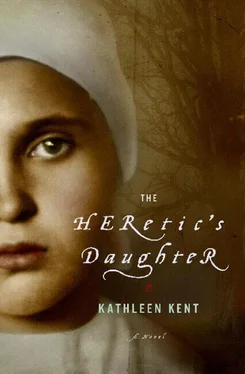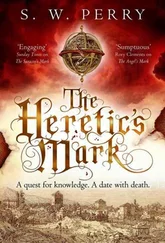I took a step. And then another. And so it went as we followed Father, who had come to take us forever away from Salem. And with every step I thought of my mother’s courage as she faced her judges. With every step I thought of her cleaving to the truth even as she fell the short distance of the rope. With every step I thought of her pride, her strength, her love.
And with every step I thought, I am my mother’s daughter, I am my mother’s daughter…
SOON AFTER FATHER had brought us home, he took us to the place where he had buried Mother. It was south of Ladle Meadow on Gibbet Plain, where she used to go as a girl with her sister. The meadow she had taken me to last spring, close to the lone elm, where the red book was buried. He could not have known about the book. It was the only place where she felt alone from her cares. We set late sprigs of rosemary around the cairn of rocks he had used to mark her grave. The morning was quiet with little wind, the leaves gently falling, their use spent except to blanket the ground for the coming cold. There were no birds calling, no streamers of pigeons or wild geese overhead, for they had already flown away south. I knelt down and placed my ear over the cairn, listening to the settling of the stones.
I remembered wondering long ago what song my mother’s bones would make. I had once imagined their singing would be as the crashing of waves, for I knew that even the fragile ocean shell carries within it the sound of hounding surf. But what I heard was a gentle rustling, an odd whistling. The sound the birdfoot violet makes as it grows through the early frosts of winter.
CHAPTER TEN
October 1692–May 1735
WE STAYED IN Andover for some time. We worked the farm, and always Father was there. His reserve never softened and yet he was gentle with us, attending every wound, every searing distemper, every horrific dream, until we were part whole again. We were left unmolested by our neighbors, and indeed the suspicion and fear people still held for us worked to our advantage. We were always given the best at barter, and in the early days of our release, there were even gifts of food or odd bits of clothing left at our doorstep. We would never know for certain who it was that brought us these gifts, as they were left in the dead of night and, as the lurcher had died, we had no warning of these visitations.
Dr. Ames traveled from Haverhill once to call on us, and though Father thanked him warmly, I believe the good doctor was disappointed in the brief discourse. There were no illuminating ideas exchanged between them, no passionate debate of the righting of wrongs, only simple expressions offered on the unsteady courses of seasons and the increase or diminishment of our livestock. And after a long pause, Father saluted his visitor and left the doctor with us in the yard to attend to his fields. After the death of his father, Dr. Nathaniel Ames moved with his wife and children to his family home in Boston and spent the rest of his life petitioning the Crown and the courts of Massachusetts for the reform of the royal prisons in the colonies.
My aunt and cousin were not set free from prison until February of 1693. A trial by jury had found them not guilty in January, but Allen could pay their prison release only by first selling his father’s horse, Bucephalus. Margaret and Aunt were carried home to Billerica in a cart but, as they took the more northerly Ipswich Road, did not pass by our door. Allen would inherit his father’s farm and would by all accounts manage his family’s homestead with a tight fist and a shrewd eye. And although Father petitioned him to allow me to be re-united with Margaret, he was unrelenting in his stony and embittered refusals.
By May all of the fifty-six remaining prisoners of the witch trials were found not guilty and freed. After months and years had passed, the wounds of our captivity were to be scabbed over by the weak-headed nods of civility from the townspeople. But these wounds were too wide and too deep to heal without a thorough scouring. Within five years of the witch trials, one Salem judge and twelve jurors made formal apologies for their part in the killing of innocents. In 1706, Ann Putnam Jr., the only one of the Salem accusers to do so, stood in front of the village meetinghouse and made a full and public renouncement of what she had done. She said, however, that her actions were not of her own doing, but rather from delusions brought on by the Devil himself. She would die at five-and-thirty years, unmarried and alone, haunted by dreams of the Salem dead.
In the same year as Ann Putnam’s confession, Mercy Williams, the girl who had been indentured to us and who had given false testimony against me, died. On a cold December day, she had fallen or, some whispered, been pushed from the Haverhill ferry as it crossed the Merrimack River. She was found at dusk, floating among the clots of ice, her red underskirt ballooning up from the gray water acting as a beacon to the searchers on the riverbank. The news brought no satisfaction, only a bitter, lingering sadness over such a wasted and tawdry life.
Visitors to our farm were few, and even the Dane family, who kept Hannah as their own, paid us very little mind. Hannah remained a fearful and timid soul even to her womanhood, and though she would marry and have her own children, her eyes would forever hold the look of the lost. She had strange fits of melancholy and was plagued her whole life with night terrors. The Danes thought it best we not upset her with visits, and so she had turned nearly twelve before I saw her again. When I was finally admitted to the Dane house, I was taken to the common room, where my sister sat, head bowed, at her spinning. Gone were the soft and dimpled curves of infancy and in their place sat the angled and rigid form of austerity. She shook my hand wanly and raised her eyes for a moment, but I knew she had mostly forgotten me. We spoke of village things and hearth things, but she never asked after Father or our brothers and I left the past alone. When I said good-bye, she nodded once and began again to work the treadle of the spinner. I cried for her on the long walk home, hiding my tears from Father, telling him she sent home with me her fidelity and her love.
As we did not return to the meetinghouse, we did not witness the resurrection of Reverend Dane back to his place at the pulpit. It seems his adversary, the Reverend Barnard, had kenned the changing and lofty tides of opinion from stern judgment and harsh consignment to solemn and doubtful consideration of spectral evidence. He had jumped with Reverend Dane into the petitions for the prisoners’ acquittal like a man caught fire.
Robert Russell stayed our friend and, with his wife, often came at times of harvest or sowing or sickness. Robert was to have his wish for sons and had five of them in startling succession with the former Widow Frye. Not two years after our release from prison, Richard married Robert’s pale, shy niece, Elizabeth Sessions.
At the end of that year, smallpox danced its way from old England to the new, claiming many for its own. We were spared, but in December, Queen Mary, sovereign of England and all her colonies, died of it.
In 1695, in the early part of August, Margaret was taken away by the Indians. A small party of Wabanaki on horseback had approached the settlement in long coats and hats and so were mistaken for neighboring townspeople. Aunt was hacked down and killed, as were ten or twelve others living in that part of Billerica. They laid a headstone for my cousin next to her mother’s because it was believed that even though her body was not found, her soul must have taken flight at the moment of capture. I was told it was a pleasant place where the headstones were set, although I would never travel there to see it. For many years after, I had dreams of Margaret, and in every one of them she was alive.
Читать дальше












